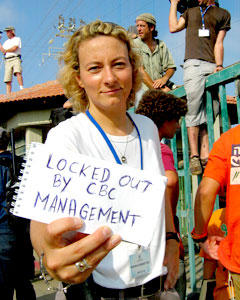I want my CBC
It's pretty much a non-issue on this side of the pond, but over in Canada a real national tragedy is taking place. Okay, so nobody's been kidnapped, held hostage or killed. But what is happening is the slow death of the one institution that manages to unite people from across the country and give them a unique voice.
It's been over 40 days now since hundreds of journalists, producers and other media workers at the Canadian Broadcasting Corporation were summarily locked out of work after voting 87% in favour of a strike over labour casualisation and union rights. The lockout has even extended to CBC reporters and news crews overseas, with foreign correspondents sitting on explosive news stories but not covering the events.

Foreign correspondent Adrienne Arsenault in the Gaza Strip.
So what does this entail? In a nutshell, it means that Canada's only public broadcaster is not reporting any Canadian news, nor is it showing new programming of any kind. Reams of news footage from BBC World are being imported to cover for the lack of international news, while local headlines are read out in bare-bones form by reluctant managers. Any new dramas, comedies or documentaries produced by the CBC have been replaced by repeats of old shows. Viewer figures, already lukewarm at best, have plummeted.
In typical Canadian fashion, it might just be the impending start of the hockey season in October that forces the CBC to reach some kind of agreement on the current dispute; Canadians have already missed one hockey season over a strike, and missing another one due to a lockout would probably kick off some kind of civil war.
Still, the point is that the CBC has obviously reached the breaking point in a crisis that has been brewing for over a decade. Funding has been gradually cut further and further back since the heady 1980s, leaving many Canadians wondering what exactly the point of the CBC is, when the same news and better shows can be found on private TV stations instead. One former director general of the CBC recently wrote a column suggesting that the broadcaster should shut down completely until it has reinvented itself from the ground up: labour, salaries, artistic direction, the works. Fine by me, but before that happens, there had better be a serious, clear-cut commitment to transforming the CBC into something that people actually want to watch, and by people I don't just mean those over 40. Younger generations simply are not watching the CBC, because most ofwhat's on offer is simply too bloody staid.
Liberal MP Sam Bulte told picketing staffers last week: "We need you. You are the strongest cultural institution that we have. Without you we are not a country." Strong words perhaps, but they betray a constant nagging worry for the CBC that the BBC has fortunately never been troubled by: the US. Yes, the BBC and other channels here import American shows, but in Canada, viewers can flip over to ABC, CNN, FOX or NBC at the flip of a switch, with many of us choosing to eschew Canadian channels altogether. And why not? There is simply no comparison between American and Canadian TV. US shows are more exciting, have more cliffhangers and complicated storylines, more dazzling special effects and more popular actors. How many average 20-year-olds are going to forego the latest episode of Lost or Desperate Housewives in favour of, erm, the latest David Suzuki documentary on the wonderful world of wombats? Or - shudder - Wind At My Back, the 'family drama' set in 1930s rural Ontario that's so saccharine it makes you want to rub extra-strength Colgate in your eyes.
Here in England, everyone has an opinion about the BBC. But love her or hate her, "Auntie" still has the ability to get the nation talking, to produce shows that will have people debating over the water cooler the next day. And that includes the under-30s. Take Little Britain, for instance. If the CBC could come up with something half as inventive and successful, they'd be beside themselves. The main thing to remember is that compared to the CBC, the Beeb makes a valiant case for why public broadcasters do have a tremendously important role to play. In a country as vast as Canada, the need for that role is even greater.
In spite of all the bitching, please don't get me wrong: I love the CBC, and I can't wait to have it back on the airwaves. A lot of people get real pleasure out of watching the CBC, and if only it (and the government) reassessed what it really means to Canadians, a whole lot more could enjoy it as well.
* * * * *
One interesting side-effect of the current lockout is the emergence of a whole host of blogs by CBC journalists, camera crews and other workers, talking about how it's affecting their lives and the lives of those around them. You can find a list of them here (scroll down the page).
Also of note, the NUJ staged a demonstration outside the BBC's Bush House in central London a couple of weeks ago, in solidarity with their CBC counterparts and in protest at the BBC's decision to plug the gaps in the CBC's coverage despite knowing that they were due to industrial action (more here).

1 Comments:
I agree with you about Trailer Park Boys. However, that show is funded by and appears exclusively on Showcase, a fantastic channel with a lot of original (and GOOD) Canadian content. However, it's privately run, and consequently has more money to play around with than the CBC.
Jesus, I never even thought of that, for Wind At My Back. Now that's all I'm gonna be able to think of. Great.
Post a Comment
<< Home